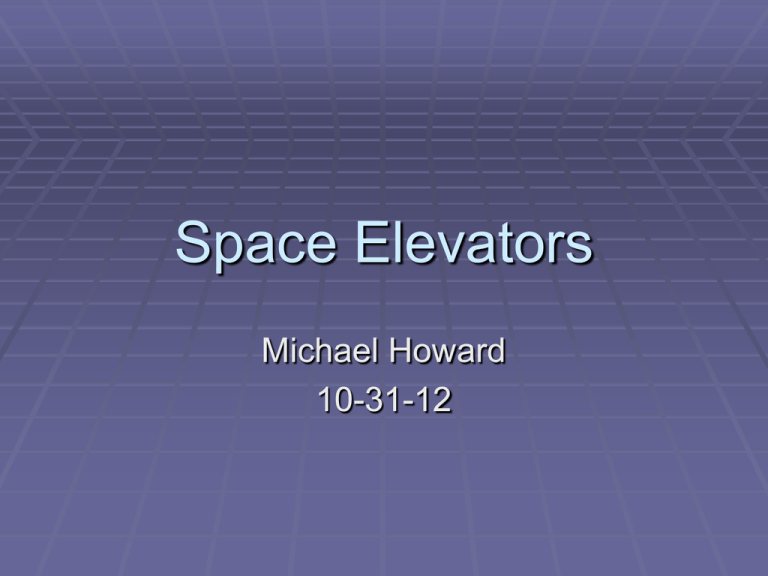Space Elevator .
advertisement

Space Elevators Michael Howard 10-31-12 Pros and Cons Benefits Cheaper space travel Allows for many more trips into space Problems Requires a very strong and light material Will be costly to build What is a Space Elevator? Rope attached to the Earth near the equator which extends directly into space and is attached to a small counterweight in geostationary orbit Will be able to transfer materials and eventually humans into space for much cheaper than it costs now Why Does the Tether Stay Up? Because the force of gravity at the bottom and the upward/outward centrifugal force at the top compete keeping the rope taut The Platform Will be placed along the equator so it will be located in the same place in the sky for ground observers Built on a ship so it can be moved The Tether Will be made of 22,000 mile long carbon nanotube strands because it is currently the only option which has the proper strength and is light enough Will need to be wider at geosynchronous altitude where it will experience the most stress and taper down as it approaches earth The Climber It will be powered by lasers and solar power It is estimated that the climb will take about 5 days Climber Counterweight Captured asteroid Space station above geostationary orbit Benefits Currently, the cost to launch a shuttle is about $10,000/lb Mechanical lifters attached to cable could carry cargo up to space for about $100 to $400 per pound Elevator vs. Rocket While rockets will undoubtedly improve greatly in efficiency there is a limit to how efficient they can become The elevator will be the next step Space tourism A space elevator could help many people realize their dream of traveling into space Problems with the elevator Will require a strong material such as carbon nanotubes which we don’t currently possess the ability to form into a long enough tether Will the public be convinced it is a good idea Cost to build it The space elevator will be the longest structure ever built but it will be simple Estimated cost to build the space elevator is about $10 billion Approximate cost of building a space shuttle is about 1.7 billion and it costs about $450 million per mission Endeavor completed 25 missions before being retired Would it be Safe? Space debris Cable snaps Storms Terrorism Conclusion The future of space travel Would set us on the path towards expanding our space exploration to places might never reach relying solely on rockets Philip Ragan, co-author of the book "Leaving the Planet by Space Elevator", states that "The first country to deploy a space elevator will have a 95 percent cost advantage and could potentially control all space activities." Parting Words “We put more effort into getting efficient at what we know how to do than into learning how to do new things. It's almost as if we're content that as a civilization we've arrived at our final destination and all that needs to be done is get comfortable. Judging by history, this is almost a sure sign of the beginning of decay.” References http://www.pbs.org/wgbh/nova/space/spac e-elevator.html http://www.howstuffworks.com/spaceelevator.htm http://www.spaceward.org/elevator http://phys.org/news151938445.html http://nextbigfuture.com/2009/01/cambridg e-making-carbon-nanotubes.html











